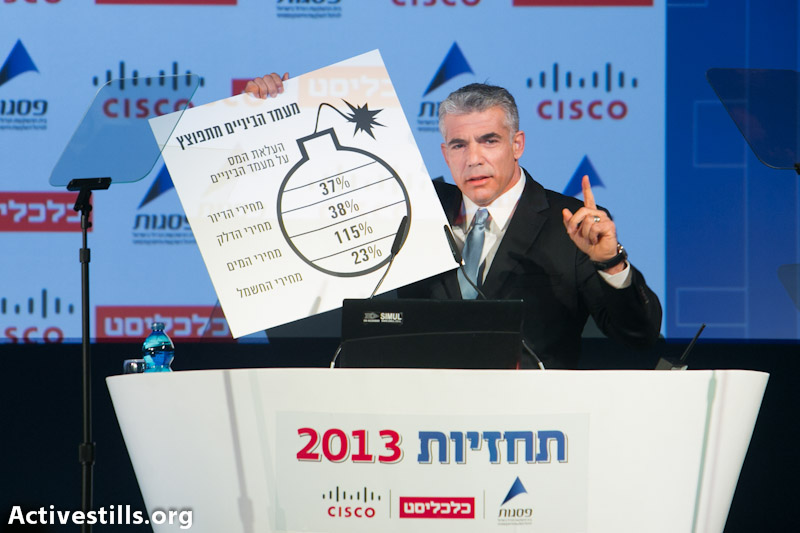The last polls ahead of Tuesday’s election have been published. Netanyahu’s Likud-Beitenu joint ticket could lose as many as eight seats, but the right-wing coalition he is projected to lead is still strong. Meretz is trending up, while Livni is losing support.
We have updated out Poll Tracker with the surveys published over the weekend. Election laws forbid publishing polls in the days immediately prior to the vote, so this is likely the last round of numbers we will see from the various polling firms, at least publicly (the parties continue to conduct internal polls sometimes).
This pie represents the average of the latest 12 available polls. The different colors represent the various Knesset blocs. In blue: Right-wing parties; black and grey: Orthodox parties; purple: center parties; red: (Jewish) left-wing parties; green: non-Zionist Palestinian parties, including Hadash, which is an Arab-Jewish party.
>> For an interactive version of this pie and more data, visit our poll tracking page.
The Orthodox and the right-wing parties are considered “natural allies,” and in the past none of these parties have ever defected from the bloc if they had a ruling majority of over 60 seats (out of the Knesset’s 120). According to our poll average, the right and Orthodox parties now have over 66 seats, meaning that Benjamin Netanyahu is the only candidate who will be able to form a governing coalition following the elections.
A word on election predictions: poll averages have been proven a rather effective way of optimizing predictions, since they increase the polling sample and reduce the margins of error. Still, they cannot overcome across-the-board biases or mistakes, like the one which could be created by a tendency of a population not to take part in polls or the fact that polls are conducted only through land-line phones. There was a lot of writing on this issue before the recent U.S. election, but ultimately the polls were for the most part accurate, and the talks of large-scale bias turned out to be mostly wishful thinking on the part of the Republicans.
Still, it is easier to predict the results in a winner-take-all competition between two sides than in the multiple system Israel has, where it’s not even clear which parties will make it into the Knesset (the threshold is 2 percent of all legal votes, which means that the smallest possible party can have 2 representatives in the 120-seat Knesset). Furthermore, complex calculations determine the allocation of the last few seats, so some variations are hard to predict.
Things could also change in the next few days, resulting in major differences between the final polls and the actual results. This happened in the last elections, when voters from the left rushed to Kadima, making it the biggest Knesset party (here is the poll average I posted in 2009, and here are the actual results).
One thing is clear though: there wasn’t a single poll (not even one!) since the campaign started which had Netanyahu’s bloc with 60 seats or less, hence the working assumption shared by the entire political system is that the prime minister will continue to a third term in office.
Winners and losers
Netanyahu is almost guaranteed to be the next prime minister, but the elections weren’t a smooth sail for him. According to our poll average, his joint ticket with Avigdor Lieberman is about to drop from 42 seats in the current Knesset to 33-34 seats in the next one. The hard right, on the other hand, is predicted to rise from 7 seats to 14-16 seats (depending whether Otzma LeYisrael enters the Knesset or not).
Labor had a bad campaign, which has the party with 16-17 seats, only 3.5 seats more than the all-time low Ehud Barak got in 2009. Meretz, on the other hand, could double its current Knesset representation of three MKs. But Meretz did better in the polls than in the actual vote in 2009 as well.
The last few polls also had former Channel 2 anchorman Yair Lapid and his Yesh Atid party doing well – he is now polling 11 seats, but he is trending upwards so don’t be surprised to see him end up with 13-14 seats.
The next government, and the next opposition
Following the elections, the various Knesset parties will need to recommend one member of the Knesset as their candidate for the prime minister’s office. As I explained, Netanyahu is likely to win this process and to be assigned the task of forming the coalition.
This is basically a new game, and Netanyahu can turn to any party he wants, including those who didn’t support him. In such cases, prime ministers tend to start by securing their base and then broadening the coalition with other parties. I expect Netanyahu to start with getting Shas and Naftali Bennett (Habayit Hayehudi) on his side – resulting in 58-59 seats. He then will try to add one or two centrist parties, probably Kadima (if it passes the Knesset threshold) and Yesh Atid. With them, he will have a coalition of 70-72 seats, which is probably the right size for a stable government (a smaller coalition gives too much bargaining power to every other party, and a larger one could be a bit chaotic).
A Netanyahu-Lieberman-Shas-Lapid coalition won’t be able to do anything on the Palestinian issue except continue the colonization of the West Bank. It will have a hard time even entering negotiations, with the talks themselves becoming completely meaningless. The survival of the coalition will be determined by Netanyahu’s ability to bridge the gap between Shas and Yesh Atid, especially on the issue of military draft reform and integrating the Orthodox sector into the work market. I think both are possible, especially with the more conservative United Torah Judaism party (the Ashkenazi Orthodox faction) out of the coalition. So I think we have a fair chance for a repetition of the last four years – a relatively stable hard-line government.
I have more expectations from the opposition though. Kadima was a disaster – it failed to challenge the government on any issue, and its members proved to be more right wing than many of those in the coalition. The next Knesset will have more of the young liberal MKs which could at least use their position to challenge Netanyahu and his partners.

The things to watch in the elections
Arab-Israeli turnout: This is the real wild card. Around 50 percent of Palestinian citizens of Israel are expected to show up to the polls – the lowest figure in Israel. If more Palestinians vote, the results of the elections could change, even dramatically (though this is not very likely).
Likud vs. extreme right: If Likud actually ends up with less than 35 seats this will be a clear failure for Netanyahu. If Bennett gets 14 or more, he could become the most important politician in the next Knesset, after Netanyahu.
Tzipi Livni & Shelly Yachimovich: Former Kadima leader Livni which now heads her own party, Hatnuah, is trending downwards. Less than 7 seats will be a failure on her part. Same goes for Labor’s Yachimovich, who could face serious opposition in her party if she drops to 16 seats or less. Most of the undecided votes are from the center and the left, so results could be very far from the predictions.
Otzma LeYisrael: This is the most racist party to run for elections since Rabbi Meir Kahane’s Kach party was kicked out of the Israeli parliament. The party’s leaders – Aryeh Eldad and Michael Ben Ari – were elected to the current Knesset as part of a bloc with another settler group, but right now they are running on their own, with most polls showing them just above the two percent threshold. Radical Kahanist from Hebron, Baruch Marzel, is at number three, and some polls predict him a Knesset seat.
I will be live blogging election night on +972, starting from around 9pm local time. We will also be posting updates and analysis on the site’s Twitter account and on our Facebook page. First exit polls will be around 10pm local time.
Adjusted polls are sometimes published after midnight. Results are usually announced in the early morning, but the soldiers and diplomats who vote are only added in the following day or two, and sometimes they change the seat allocation a bit.
Related:
+972 Magazine’s Israeli election page
Knesset Poll tracker
Analysis: Israelis cannot ‘democratically’ decide to continue the occupation




